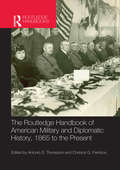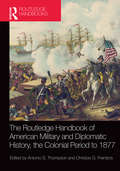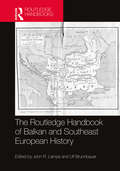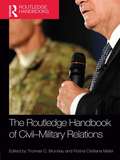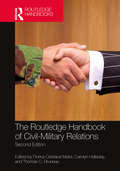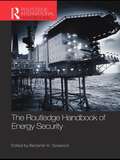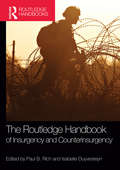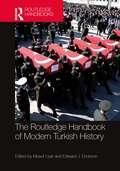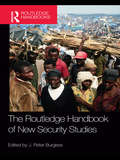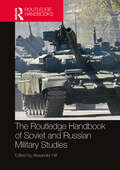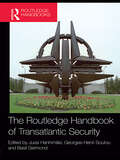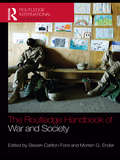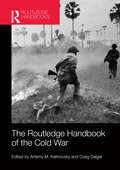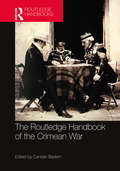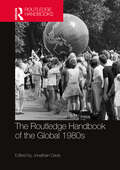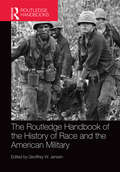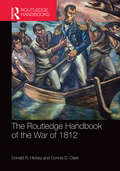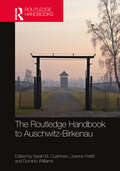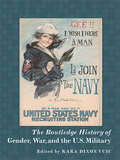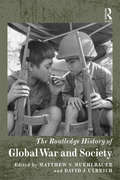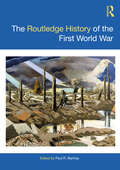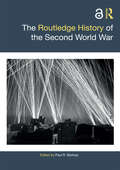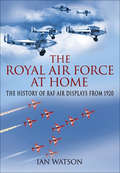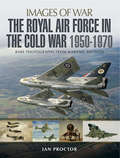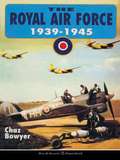- Table View
- List View
The Routledge Handbook of American Military and Diplomatic History: 1865 to the Present
by Antonio S. Thompson Christos G. FrentzosThe Routledge Handbook of U.S. Military and Diplomatic History provides a comprehensive analysis of the major events, conflicts, and personalities that have defined and shaped the military history of the United States in the modern period. Each chapter begins with a brief introductory essay that provides context for the topical essays that follow by providing a concise narrative of the period, highlighting some of the scholarly debates and interpretive schools of thought as well as the current state of the academic field. Starting after the Civil War, the chapters chronicle America's rise toward empire, first at home and then overseas, culminating in September 11, 2001 and the War on Terror. With authoritative and vividly written chapters by both leading scholars and new talent, maps and illustrations, and lists of further readings, this state-of-the-field handbook will be a go-to reference for every American history scholar's bookshelf.
The Routledge Handbook of American Military and Diplomatic History: The Colonial Period to 1877
by Antonio S. Thompson and Christos G. FrentzosThe Routledge Handbook of American Military and Diplomatic History provides a comprehensive analysis of the major events, conflicts, and personalities that have defined and shaped the military history of the United States. This volume, The Colonial Period to 1877, illuminates the early period of American history, from the colonial warfare of the 17th century through the tribulations of Reconstruction. The chronologically organized sections each begin with an introductory chapter that provides a concise narrative of the period and highlights the scholarly debates and interpretive schools of thought in the historiography, followed by topical chapters on issues in the period. Topics covered include colonial encounters and warfare, the French and Indian War, the American Revolution, diplomacy in the early American republic, the War of 1812, westward expansion and conquest, the Mexican-American War, the Civil War, and Reconstruction. With authoritative and vividly written chapters by both leading scholars and new talent, this state-of-the-field handbook will be a go-to reference for every American history scholar's bookshelf.
The Routledge Handbook of Balkan and Southeast European History
by Lampe, John R. / Brunnbauer, UlfDisentangling a controversial history of turmoil and progress, this Handbook provides essential guidance through the complex past of a region that was previously known as the Balkans but is now better known as Southeastern Europe. It gathers 47 international scholars and researchers from the region. They stand back from the premodern claims and recent controversies stirred by the wars of Yugoslavia’s dissolution. Parts I and II explore shifting early modern divisions among three empires to the national movements and independent states that intruded with Great Power intervention on Ottoman and Habsburg territory in the nineteenth century. Part III traces a full decade of war centered on the First World War, with forced migrations rivalling the great loss of life. Part IV addresses the interwar promise and the later authoritarian politics of five newly independent states: Albania, Bulgaria, Greece, Romania, and Yugoslavia. Separate attention is paid in Part V to the spread of European economic and social features that had begun in the nineteenth century. The Second World War again cost the region dearly in death and destruction and, as noted in Part VI, in interethnic violence. A final set of chapters in Part VII examines postwar and Cold War experiences that varied among the four Communist regimes as well as for non-Communist Greece. Lastly, a brief Epilogue takes the narrative past 1989 into the uncertainties that persist in Yugoslavia’s successor states and its neighbors. Providing fresh analysis from recent scholarship, the brief and accessible chapters of the Handbook address the general reader as well as students and scholars. For further study, each chapter includes a short list of selected readings.
The Routledge Handbook of Civil-Military Relations
by Thomas C. Bruneau Florina Cristiana MateiThis new Handbook offers a wide-ranging, internationally focused overview of the field of civil–military relations. The armed forces are central actors in most societies and are involved in many different roles. Amongst other activities, they engage in peace operations, support the police in fighting crime, support civilian authorities in dealing with natural disasters, and fight against terrorists and in internal conflicts. The existing literature on this subject is limited in its discussion of war-fighting and thus does not do justice to this variety of roles. The Routledge Handbook of Civil–Military Relations not only fills this important lacuna, but offers an up-to-date comparative analysis which identifies three essential components in civil–military relations: (1) democratic civilian control; (2) operational effectiveness; and (3) the efficiency of the security institutions. Amalgamating ideas from key thinkers in the field, the book is organized into three main parts: Part I: Development of the Field of Study; Part II: Civil–Military Relations in Non-Democratic or Nominally Democratic Countries; Part III: Civil–Military Relations in Democratic and Democratizing States: Issues and Institutions. This new Handbook will be essential reading for students and practitioners in the fields of civil–military relations, defense studies, war and conflict studies, international security and IR in general.
The Routledge Handbook of Civil-Military Relations
by Florina Cristiana MateiThis second edition of The Routledge Handbook of Civil-Military Relations offers a wide-ranging, internationally focused overview of the field of civil-military relations. The armed forces are central actors in most societies and are involved in many different roles. Amongst other activities, they engage in peace operations, support the police in fighting crime, support civilian authorities in dealing with natural disasters, and fight against terrorists and in internal conflicts. The existing literature on this subject is limited in its discussion of warfighting and thus does not do justice to the variety of roles. This second edition not only fills this important lacuna but offers an up-to-date comparative analysis and provides a conceptual framework to analyze how strategies can realistically be implemented. Amalgamating ideas from key thinkers in the field, the book is organized into three main thematic parts: Part I: Civil-Military Relations in Non-Democratic States and Illiberal Democracies; Part II: Civil-Military Relations in New Democracies; Part III: Civil-Military Relations in Established Democracies. This handbook will be essential reading for students and practitioners in the fields of civil-military relations, defense studies, war and conflict studies, international security, and IR in general.
The Routledge Handbook of Energy Security (Routledge International Handbooks Ser.)
by Benjamin K. SovacoolThis Handbook examines the subject of energy security: its definition, dimensions, ways to measure and index it, and the complicating factors that are often overlooked. The volume identifies varying definitions and dimensions of energy security, including those that prioritize security of supply and affordability alongside those that emphasize availability, energy efficiency, trade, environmental quality, and social and political stewardship. It also explores the various metrics that can be used to give energy security more coherence, and also to enable it to be measured, including recent attempts to measure energy security progress at the national level, with a special emphasis placed on countries within the Organization of Economic Cooperation and Development (OECD), countries within Asia, and industrialized countries worldwide. This Handbook: • Broadens existing discussions of energy security that center on access to fuels, including "oil security" and "coal security." • Focuses not only on the supply side of energy but also the demand, taking a hard look at energy services and politics along with technologies and infrastructure; • Investigates energy security issues such as energy poverty, equity and access, and development; • Analyzes ways to index and measure energy security progress at the national and international level. This book will be of much interest to students of energy security, energy policy, economics, environmental studies, and IR/Security Studies in general.
The Routledge Handbook of Insurgency and Counterinsurgency
by Isabelle Duyvesteyn Paul B. RichThis new handbook provides a wide-ranging overview of the current state of academic analysis and debate on insurgency and counterinsurgency, as well as an-up-to date survey of contemporary insurgent movements and counter-insurgencies. In recent years, and more specifically since the insurgency in Iraq from 2003, academic interest in insurgency and counterinsurgency has substantially increased. These topics have become dominant themes on the security agenda, replacing peacekeeping, humanitarian operations and terrorism as key concepts. The aim of this volume is to showcase the rich thinking that is available in the area of insurgency and counterinsurgency studies and act as a further guide for study and research. In order to contain this wide-ranging topic within an accessible and informative framework, the Editors have divided the text into three key parts: Part I: Theoretical and Analytical Issues Part II: Insurgent Movements Part III: Counterinsurgency Cases The Routledge Handbook of Insurgency and Counterinsurgency will be of great interest to all students of insurgency and small wars, terrorism/counter-terrorism, strategic studies, security studies and IR in general, as well as professional military colleges and policymakers.
The Routledge Handbook of Modern Turkish History (Routledge History Handbooks)
by Edward J. Erickson Mesut UyarThis handbook is an innovative recasting and reinterpretation of modern Turkish history centered on war and society. It covers much neglected conflicts and wars and provides new insights about its complex politics, military, diplomacy, and people.The Turkish Republic was born after a series of wars which dismantled the Ottoman Empire and left the foundation of a state with new and reduced borders. Turkey's foreign policy has been characterized for the last century by Mustafa Kemal Atatürk's principle of "peace at home, peace in the world", but in practice, it has had to fight foreign wars outside of its geography and battle counterinsurgency inside its borders against various rebel movements. Although wars and conflicts were instrumental in shaping Turkey, they have received very little scholarly attention, and they are mostly absent in western studies of modern Turkey. Rather than advocating for a single accepted interpretation of Turkish history, this book aims to highlight the complexity of modern Turkish history and the diversity in interpretations.Presenting a coherent and condensed history of modern Turkey in a reader-friendly way, this handbook offers students and general readers the sound background to better understand Turkey within its international and transnational context.
The Routledge Handbook of New Security Studies
by J. Peter BurgessThis new Handbook gathers together state-of-the-art theoretical reflection and empirical research by a group of leading international scholars in the subdiscipline of Critical Security Studies. In today’s globalised setting, the challenge of maintaining security is no longer limited to the traditional foreign-policy and military tools of the nation-state, and security and insecurity are no longer considered as dependent only upon geopolitics and military strength, but rather are also seen to depend upon social, economic, environmental, ethical models of analysis and tools of action. The contributors discuss and evaluate this fundamental shift in four key areas: New security concepts New security subjects New security objects New security practices Offering a comprehensive theoretical and empirical overview of this evolving field, this book will be essential reading for all students of critical security studies, human security, international/global security, political theory and IR in general. J. Peter Burgess is Research Professor at PRIO, the International Peace Research Institute, Oslo, where he leads the Security Programme and edits the interdisciplinary journal Security Dialogue. In addition, he is Adjunct Professor at the Norwegian University of Science and Technology, Trondheim (NTNU), and Research Fellow at the Institute for European Studies, Brussels.
The Routledge Handbook of Soviet and Russian Military Studies
by Alexander HillThis handbook brings together historical and contemporary essays about Soviet and Russian military studies, to offer a comprehensive volume on the topic.Comprising essays written by acknowledged specialists, the handbook examines the development of the Russian and Soviet armed forces from the Napoleonic Wars all the way through to the course and conduct of the ‘Special Military Operation’ in Ukraine. Divided into thematic and chronological sections, the volume looks at wars fought by the Tsarist regime through to the First World War; the Soviet Union’s ‘Great Patriotic War’, from 1941 to 1945; the Cold War (including the Soviet war in Afghanistan); and Russia’s post-Soviet wars and military development. In addition, the volume also includes a section that analyses a number of ‘overarching themes’, including the development of Russian and Soviet airpower, partisan warfare, counterinsurgency and the role of women in Russian and Soviet armed forces. The volume concludes with an essay looking at whether, using the historical material and material on the conduct of the war in Ukraine, we can reasonably talk of a ‘Russian way of war’.This volume will be of considerable interest to students of the Soviet Union and Russia, strategic studies and military history.
The Routledge Handbook of Transatlantic Security
by Basil GermondThis new Handbook provides readers with the tools to understand the evolution of transatlantic security from the Cold War era to the early 21st century. After World War II, the US retained a strong presence as the dominant member of NATO throughout the Cold War. Former enemies, such as Germany, became close allies, while even countries that often criticized the United States made no serious attempt to break with Washington. This pattern of security co-operation continued after the end of the Cold War, with NATO expansion eastwards extending US influence. Despite the Iraq war prompting a seemingly irreparable transatlantic confrontation, the last years of the Bush administration witnessed a warming of US-European relations, expected to continue with the Obama administration. The contributors address the following key questions arising from the history of transatlantic security relations: What lies behind the growing and continuing European dependency on security policy on the United States and what are the political consequences of this? Is this dependency likely to continue or will an independent European Common Foreign and Security Policy eventually emerge? What has been the impact of 'out-of-area' issues on transatlantic security cooperation? The essays in this Handbook cover a broad range of historical and contemporary themes, including the founding of NATO; the impact of the Korean War; the role of nuclear (non-)proliferation; perspectives of individual countries (especially France and Germany); the impact of culture, identity and representation in shaping post-Cold War transatlantic relations; institutional issues, particularly EU-NATO relations; the Middle East; and the legacy of the Cold War, notably tensions with Russia. This Handbook will be of much interest to students of transatlantic security, NATO, Cold War Studies, foreign policy and IR in general.
The Routledge Handbook of War and Society: Iraq and Afghanistan
by Morten G. Ender Steven Carlton-FordThis new handbook provides an introduction to current sociological and behavioral research on the effects of the wars in Iraq and Afghanistan. The wars in Iraq and Afghanistan represent two of the most interesting and potentially troubling events of recent decades. These two wars-so similar in their beginnings-generated different responses from various publics and the mass media; they have had profound effects on the members of the armed services, on their families and relatives, and on the people of Iraq and Afghanistan. Analyzing the effect of the two wars on military personnel and civilians, this volume is divided into four main parts: Part I: War on the Ground: Combat and Its Aftermath Part II: War on the Ground: Non-Combat Operations, Noncombatants, and Operators Part III: The War Back Home: The Social Construction of War, Its Heroes, And Its Enemies Part IV: The War Back Home: Families and Youth on the Home Front With contributions from leading academic sociologists, anthropologists, psychologists, military researchers, and researchers affiliated with Non-Governmental Organizations (NGOs), this Handbook will be of interest to students of the Iraq and Afghanistan wars, military sociology and psychology, war studies, anthropology, US politics, and of youth. Steven Carlton-Ford is associate professor of Sociology at the University of Cincinnati. He recently served for five years as the editor of Sociological Focus. Morten G. Ender is professor of sociology and Sociology Program Director at West Point, the United States Military Academy. He is the author of American Soldiers in Iraq (Routledge 2009).
The Routledge Handbook of the Cold War
by Artemy M. Kalinovsky Craig DaigleThis new Handbook offers a wide-ranging overview of current scholarship on the Cold War, with essays from many leading scholars. The field of Cold War history has consistently been one of the most vibrant in the field of international studies. Recent scholarship has added to our understanding of familiar Cold War events, such as the Korean War, the Cuban Missile Crisis and superpower détente, and shed new light on the importance of ideology, race, modernization, and transnational movements. The Routledge Handbook of the Cold War draws on the wealth of new Cold War scholarship, bringing together essays on a diverse range of topics such as geopolitics, military power and technology and strategy. The chapters also address the importance of non-state actors, such as scientists, human rights activists and the Catholic Church, and examine the importance of development, foreign aid and overseas assistance. The volume is organised into nine parts: Part I: The Early Cold War Part II: Cracks in the Bloc Part III: Decolonization, Imperialism and its Consequences Part IV: The Cold War in the Third World Part V: The Era of Detente Part VI: Human Rights and Non-State Actors Part VII: Nuclear Weapons, Technology and Intelligence Part VIII: Psychological Warfare, Propaganda and Cold War Culture Part IX: The End of the Cold War This new Handbook will be of great interest to all students of Cold War history, international history, foreign policy, security studies and IR in general.
The Routledge Handbook of the Crimean War
by Candan BademThe Routledge Handbook of the Crimean War is an edited collection of articles on the various aspects of the Crimean War written by distinguished historians from various countries. Part I focuses on diplomatic, military and regional perspectives. Part II includes contributions on social, cultural and international issues around the war. All contributions are based upon findings of the latest research. While not pretending to be an exhaustive encyclopaedia of this first modern war, the present volume captures the most important topics and the least researched areas in the historiography of the war. The book incorporates new approaches in national historiographies to the war and is intended to be the most up-to-date reference book on the subject. Chapters are devoted to each of the belligerent powers and to other peripheral states that were involved in one way or another in the war. The volume also gives more attention to the Ottoman Empire, which is generally neglected in European books on the war. Both the general public and students of history will find the book useful, balanced and up-to-date.
The Routledge Handbook of the Global 1980s
by Jonathan DavisThe 1980s was a decade of enormous global change. Upheaval from the top of governments to the bottom of societies saw a new world order begin to emerge. A new form of capitalism redefined global economics on both the right and left as market forces were unleashed. The ideological conflict of the previous four decades petered out as superpower relations improved. A more interconnected world introduced new consumer products and forms of popular culture to societies across the globe. And protest movements saw new battles fought and new alliances forged in an increasingly interdependent world.The Routledge Handbook of the Global 1980s brings together specialists from across the world to examine how the decade was shaped by these changes to politics, economics, culture, societies, and protest movements. The Handbook is divided into five parts focusing on the global environment, globalisation and neoliberalism, politics and society, culture and society, and the closing stages of the global Cold War.By taking an international approach to the history of the 1980s, this book offers a wide-ranging and important new perspective of this hugely transformative decade. It will appeal to students and scholars alike as well as all those interested in the political, social, economic, and cultural shifts of the 1980s.
The Routledge Handbook of the History of Race and the American Military (Routledge History Handbooks)
by Geoffrey JensenThe Routledge Handbook of the History of Race and the American Military provides an important overview of the main themes surrounding race in the American military establishment from the French and Indian War to the present day. By broadly incorporating the latest research on race and ethnicity into the field of military history, the book explores the major advances that have taken place in the past few decades at the intersection of these two fields. The discussion goes beyond the study of battles and generals to look at the other peoples who were involved in American military campaigns and analyzes how African Americans, Native Americans, Asian Americans, and Chicanos helped shape the course of American History—both at home and on the battlefield. The book also includes coverage of American imperial ambitions and the national response to encountering other peoples in their own countries. The Routledge Handbook of the History of Race in the American Military defines how the history of race and ethnicity impacts military history, over time and comparatively, while encouraging scholarship on specific groups, periods, and places. This important collection presents a comprehensive survey of the current state of the field.
The Routledge Handbook of the War of 1812 (Routledge International Handbooks Ser.)
by Donald R. Hickey Connie D. ClarkThe War of 1812 ranged over a remarkably large territory, as the fledgling United States battled Great Britain at sea and on land across what is now the eastern half of the U.S. and Canada. Native people and the Spanish were also involved in the war’s interrelated conflicts. Often overlooked, the War of 1812 has been the subject of an explosion of new research over the past twenty-five years. The Routledge Handbook of the War of 1812 brings together the insights of this research through an array of fresh essays by leading scholars in the field, offering an overview of current understandings of the war that will be a vital reference for students and researchers alike. The essays in this volume examine a wide range of military, political, social, and cultural dimensions of the war. With full consideration given to American, Canadian, British, and native viewpoints, the international group of contributors place the war in national and international context, chart the course of events in its different theaters, consider the war’s legacy and commemoration, and examine the roles of women, African Americans, and natives. Capturing the state of the field in a single volume, this handbook is a must-have resource for anyone with an interest in early America.
The Routledge Handbook to Auschwitz-Birkenau
by Dominic Williams Joanne Pettitt Sarah M. CushmanThis handbook examines Auschwitz-Birkenau as both a site and a symbol of Nazi genocide. Scholars from a range of disciplinary perspectives consider Auschwitz’s history by engaging with Holocaust historiography and its place in Holocaust memory and representation, illustrating their mutual influence.The chapters bring new insights to topics that other studies of Auschwitz have explored before, such as the Sonderkommando, the Czech family camp, and literary representations of Auschwitz. Other chapters cover recent developments and more neglected areas, such as the experience and memory of Romani prisoners, the fate of Soviet prisoners of war, and Auschwitz’s presence on social media. The handbook also responds to a number of recent trends and new paradigms in Holocaust Studies, including contributions from the fields of Environmental Studies, Spatial Studies, and Gender Studies.As a crucial overview of the topic of Auschwitz-Birkenau and an introduction to its most recent and fruitful scholarly approaches, this handbook will be a valuable resource for undergraduates from second year and up, as well as for graduate students and researchers seeking a survey of the field.
The Routledge History of Gender, War, and the U.S. Military (Routledge Histories)
by Kara D. VuicThe Routledge History of Gender, War, and the U.S. Military is the first examination of the interdisciplinary, intersecting fields of gender studies and the history of the United States military. In twenty-one original essays, the contributors tackle themes including gendering the "other," gender and war disability, gender and sexual violence, gender and American foreign relations, and veterans and soldiers in the public imagination, and lay out a chronological examination of gender and America’s wars from the American Revolution to Iraq. This important collection is essential reading for all those interested in how the military has influenced America's views and experiences of gender.
The Routledge History of Global War and Society (Routledge Histories)
by Matthew S. Muehlbauer David J. UlbrichThe Routledge History of Global War and Society offers a sweeping introduction to the most significant research on the causes, experiences, and impacts of war throughout history. This collection of twenty-seven essays by leading historians demonstrates how war and society studies have dramatically expanded the chronological, geographic, and thematic breadth of the field of military history. Each chapter addresses the ways in which recent scholarship has integrated cultural, ethical, environmental, medical, and ideological factors to explain both conventional conflicts and genocide, terrorism, and other forms of mass violence. The broad scope of the collection makes it the perfect primer for scholars and students seeking to understand the complex interactions of warfare and those affecting and affected by conflict.
The Routledge History of the First World War (Routledge Histories)
by Paul R. BartropThe Routledge History of the First World War is a work which, in a single volume, covers a range of major themes and issues relating to that conflict.Providing a comprehensive but readily accessible reference work examining the First World War, in accordance with a broad range of themes, this book presents the many ways in which study of the First World War can take place and introduces readers to new areas of research, often untouched in other studies of the war. With a scholarly Introduction and 60 chapters by specialist authors who come from 14 different countries, across four continents, the book is also intended to open lines of further inquiry from its solid base of academic knowledge. The volume demonstrates the war’s global and total nature, examining the conflict in all major theatres and through the lens of the key combatants and neutrals. It also fully engages with issues of race, gender, ideology, and society during the war.This book will appeal to students of all levels, scholars, and general readers alike interested in the First World War from several different perspectives and research areas. The 60 chapters cover topics from numerous angles and provide detailed information about all aspects relating to the First World War.
The Routledge History of the Second World War (Routledge Histories)
by Paul R. BartropThe Routledge History of the Second World War sums up the latest trends in the scholarship of that conflict, covering a range of major themes and issues. The book delivers a thematic analysis of the many ways in which study of the Second World War can take place, considering international, transnational, and global approaches, and serves as a major jumping off point for further research into the specific fields covered by each of the expert authors. It demonstrates the global and total nature of the Second World War, giving due coverage to the conflict in all major theatres and through the lens of the key combatants and neutrals, examines issues of race, gender, ideology, and society during the war, and functions as a textbook to educate students as to the trends that have taken place in how the conflict has been (and can be) interpreted in the modern world. Divided into twelve parts that cover central themes of the conflict, including theatres of war, leadership, societies, occupation, secrecy and legacies, it enables those with no memory of war to approach it with a view to comprehending what it was all about and places the history of this conflict into a context that is international, transnational, and institutional. This is a comprehensive and accessible reference volume for anyone interested in the most up to date scholarship on this major conflict.
The Royal Air Force at Home: The History of RAF Air Displays from 1920
by Ian Watson"Military public relations endeavors ultimately seek to build a sense of common interests and aims, and so generally foster good relations with the people they defend, and there in ensure a stable society. The armed forces when engaging on any public relations exercise, have traditionally sought to provide an entertaining spectacle. For years this has been typified by parades, bands, mock battles, drill displays and other relevant feats of military prowess which have captured the imagination of the public and inspired potential recruits. The 20th Century brought a new dimension to the field of warfare and subsequently added a new strand to the fabric of public ceremony and displays by the armed forces. That new dimension was the arrival of powered flight.Display flying began within five years of the Wright Brothers making their milestone first flight. The first events staged in Britain which centered on demonstrations by flying machines, were organized by the town councils of Blackpool and Doncaster and were held within days of each other in October 1909. 1920 was the year that the first of the famed and legendary Hendon Air Pageants was staged, and this is where military air shows traditionally began. The Hendon Displays were organized and staged by the still fledging Royal Air Force and it was probably due in no small part to the prestige and spectacle of this fresh new dimension of military pageantry, together with other like events held at RAF airfields through the next two decades, that the very existence of the RAF was saved from the threat of abolition. The history of the RAF's commitment (one that compares almost uniquely with other air forces) toward display flying through the years after World War II has now come of age. This account of their record in this often overlooked but then again traditional field of military customs, describes and illustrates the major public RAF events since 1920."
The Royal Air Force in the Cold War, 1950–1970: Rare Photographs From Wartime Archives (Images of War)
by Ian ProctorSoon after the Second world War, wartime allies became Cold War adversaries, and by 1950 the perceived threat of a Soviet strike on Western Europe or Britain dominated military planning. For the next forty years, the Royal Air Force was in the front-line of the Cold War. In Britain and Germany, light bomber crews exercised in preparation for a future conflict, while interceptor pilots stood by ready to counter incursions by Soviet aircraft. Between 1956 and 1969, the elite crews of the iconic V-Force of nuclear bombers trained to perform the ultimate mission, striking targets deep in the heart of Russia. Protecting British interests overseas, personnel at stations across the Middle East and Far East were regularly engaged in supporting operations during the many colonial conflicts which occurred throughout the 1950s and 1960s.Undertaking these duties were new British-designed aircraft introduced to squadrons from the early–1950s. The names of these extraordinary aircraft, which included the Hunter, Lightning, Vulcan and Canberra, became synonymous with the Cold War.In this book, Ian Proctor uses over 150 highly evocative colour images from a single remarkable Air Ministry collection to portray the RAF and its personnel between 1950 and 1970. He provides a selected insight into service life, the aircraft, recruitment and training, and the operations and exercises undertaken by the RAF during a twenty year period of the Cold War.
The Royal Air Force, 1939–1945
by Chaz BowyerThis book examines every aspect of The Royal Air Force, including organisation, statistics and operations during World War Two.
